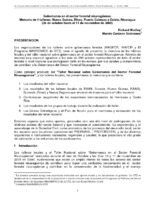| dc.contributor.author | Modley, Richard | |
| dc.contributor.author | Centeno Solórzano, Marvin | |
| dc.date.accessioned | 2018-09-02T05:45:11Z | |
| dc.date.available | 2018-09-02T05:45:11Z | |
| dc.date.issued | 2006-11 | |
| dc.identifier.uri | http://cladista.clad.org//handle/123456789/4248 | |
| dc.description.abstract | Nicaragua possesses extensive natural forest cover and has high economic and livelihood dependence on natural resources. However, Nicaragua possesses the highest deforestation rate of Central America jeopardizing the sustainable development of land use. The main causes for the continuous deforestation rate are the expanding agricultural frontiers, illegal logging and institutionalised forest sector corruption. | |
| dc.description.abstract | The discussion in the national media on deforestation, especially on illegal logging is a hot topic that called for political high level action in 2005. But the solutions to tackle the problems consisted only of further legal restrictions and few root causes analysis and action. | |
| dc.description.abstract | With several work shops on forest governance, documented in this report, the government and civil society of Nicaragua, in October and November 2005, discussed the reasons for the failure of good governance in the forest sector on all levels of society. The work shops where realized in a participatory manner. In total over 200 key actors of the Nicaraguan forest sector participated and did formulate recommendations. The resulting recommendations will support the implementation of the forest chapter of the new 2006 launched rural development programme (PRORURAL/FORESTAL) of Nicaragua, financed by the government and donors in a Sector Wide Approach (SWAp). The participants of the work shop created a support group (Comité de Apoyo a la Gobernanza Forestal) consisting of seven government and civil society representatives with the task to support, monitor and asses the implementation of the recommendations. | |
| dc.description.abstract | Strengthen already existing mechanisms of participatory decision making as the CONAFOR (for forests), CAM (environment) and CCF on national, regional and community level. The participatory mechanisms have to be revised and improved. | |
| dc.description.abstract | Administrative and operative decentralization of the SWAp PRORURAL/FORESTAL including the strengthening of the local executing institutions. | |
| dc.description.abstract | Align the planning of all institutions and forestry activities to the Land Planning Mechanisms of the communities (POTEM). Further, the decision makers on community action plans and national development plans have to be capacitated and should take into account the importance of proper land ownership rights and implementation mechanisms (Ley de Ordenamiento Territorial). | |
| dc.description.abstract | Decrease of illegal logging. Revision of the forest management permission regulations towards a simplification, with maintaining the principles of sustainable forest management (PGMF and EIA). Support with PRORURAL an increased implementation of the management plans regulations (PGMF).Strengthen the forest certification and the monitoring mechanisms (regentes forestales) as foreseen in the law. | |
| dc.description.abstract | Investigate the possibility of a reorganisation of the forest service and relevant institutions to better serve the marked chains of forest goods. Support within PRORURAL/FORESTAL the development of working market chains for forest products to improve the competitiveness of the forest sector. Accompany and support the changes in forest industries. | |
| dc.description.abstract | Facilitate trough PRORURAL/ FORESTAL as other programs the access and development of finance mechanisms especially for small and medium sized businesses. | |
| dc.format.extent | 21 p. | |
| dc.language | Español | |
| dc.publisher | Sociedad Alemana de Cooperación Técnica | |
| dc.rights | Creative Commons BY-SA-NC 4.0 Int | |
| dc.rights.uri | http://creativecommons.org/licenses/by-nc-nd/4.0/ | |
| dc.subject | CONGRESO CLAD 11-2006 | |
| dc.subject | GOBERNANZA | |
| dc.subject | DESCENTRALIZACION | |
| dc.subject | RELACIONES INTERINSTITUCIONALES | |
| dc.subject | POLITICA FORESTAL | |
| dc.subject | INFORME DE REUNION | |
| dc.title | Gobernanza en el sector forestal nicaragüense. Memoria de cuatro talleres: Nueva Guinea, Rivas, Puerto Cabezas y Estela, Nicaragua, 26 de octubre - 11 de noviembre de 2005 | |
| dc.type | article | |
| clad.congress | Congreso Internacional del CLAD sobre la Reforma del Estado y de la Administración Pública, 11 | |
| clad.key | MFN38850--38850 | |
| clad.key1 | KEY38850 | |
| clad.region | NICARAGUA | |
| clad.md5 | 663f16252d4b0d66f55d732281bd1621 | |


